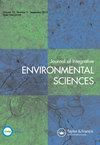水-能-食物关系治理的概念基础:运用网络与话语分析的系统文献回顾
IF 3.5
4区 环境科学与生态学
Q3 ENVIRONMENTAL SCIENCES
Journal of Integrative Environmental Sciences
Pub Date : 2020-04-15
DOI:10.1080/1943815x.2020.1749086
引用次数: 35
摘要
在过去的十年中,关于水、能源和食物治理(WEF)的争论愈演愈烈,催生了“关系治理”这一术语。总的来说,减少权衡和构建世界经济论坛之间的协同效应已被列入科学、政治和经济议程。然而,尽管越来越多地使用,很难找到一个明确的含义和定义的术语代表什么。基于系统文献综述(SLR),使用文本挖掘和机器学习算法,本文调查了关系治理辩论的概念基础,并试图澄清这些文献中的主题、网络和差距。该分析以定量和定性相结合的方法为基础,将社会网络分析(SNA)和话语分析(DA)相结合。结果强调了24个与治理相关的概念支持这一文献,分为8组:水和流域治理;环境和系统治理;风险与资源安全治理;经济治理;全球治理;城市管理;一体化合作治理;以及“认识论”和跨学科的治理。本文章由计算机程序翻译,如有差异,请以英文原文为准。
The conceptual basis of water-energy-food nexus governance: systematic literature review using network and discourse analysis
ABSTRACT In the last decade, the debate on the governance of water, energy, and food (WEF) has intensified, spurring the emergence of the term “nexus governance.” In general, the reduction of trade-offs and construction of synergies between WEF have been placed on the scientific, political, and economic agenda. However, although increasingly used, it is difficult to find a clear meaning and definition of what the term represents. Based on a systematic literature review (SLR), using text-mining and machine learning algorithms, this article investigates what are the conceptual basis of the nexus governance debate, and attempts to clarify the main themes, networks, and gaps within this literature. The analysis is based on quantitative and qualitative methods, combining social network analysis (SNA) and discourse analysis (DA). The results highlighted that twenty-four governance-related concepts support this literature, breaking down into eight groups: water and basin governance; environmental and systems governance; risk and resource security governance; economic governance; global governance; urban governance; integrative and cooperative governance; and “epistemic” and transdisciplinary governance.
求助全文
通过发布文献求助,成功后即可免费获取论文全文。
去求助
来源期刊

Journal of Integrative Environmental Sciences
ENVIRONMENTAL SCIENCES-
CiteScore
3.90
自引率
0.00%
发文量
13
审稿时长
>12 weeks
期刊介绍:
Journal of Integrative Environmental Sciences (JIES) provides a stimulating, informative and critical forum for intellectual debate on significant environmental issues. It brings together perspectives from a wide range of disciplines and methodologies in both the social and natural sciences in an effort to develop integrative knowledge about the processes responsible for environmental change. The Journal is especially concerned with the relationships between science, society and policy and one of its key aims is to advance understanding of the theory and practice of sustainable development.
 求助内容:
求助内容: 应助结果提醒方式:
应助结果提醒方式:


